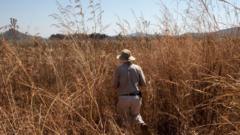The government has stated that this initial compensation will address 378 of the 740 approved farms, amounting to just 1% of the allocated $311 million for the first group of payments, which will be later completed through US-dollar designated Treasury bonds. Finance Minister Mthuli Ncube pointed out this move serves as a commitment to reforming Zimbabwe's economy and clearing its debt.
Despite this progress, many former farmers have yet to accept the compensation terms, as the government has limited its payouts to the value of “improvements” made on the land rather than for the land itself, attributing the original land grabs to colonial injustices. Notably, foreign-owned farms were prioritized in earlier negotiations.
This compensation step follows the tumultuous history surrounding land redistribution in Zimbabwe, initiated post-independence in 1980. In the early 2000s, then-President Robert Mugabe's land invasions brought international backlash and deteriorated relations with Western nations. Current President Emmerson Mnangagwa, who succeeded Mugabe in 2017, has aimed to restore diplomatic ties with the West and stabilize the nation's economy.
As Zimbabwe continues to grapple with its economic woes, analysts view this compensation initiative as a crucial step towards repairing international relations and easing the country’s long-standing financial isolation.
Despite this progress, many former farmers have yet to accept the compensation terms, as the government has limited its payouts to the value of “improvements” made on the land rather than for the land itself, attributing the original land grabs to colonial injustices. Notably, foreign-owned farms were prioritized in earlier negotiations.
This compensation step follows the tumultuous history surrounding land redistribution in Zimbabwe, initiated post-independence in 1980. In the early 2000s, then-President Robert Mugabe's land invasions brought international backlash and deteriorated relations with Western nations. Current President Emmerson Mnangagwa, who succeeded Mugabe in 2017, has aimed to restore diplomatic ties with the West and stabilize the nation's economy.
As Zimbabwe continues to grapple with its economic woes, analysts view this compensation initiative as a crucial step towards repairing international relations and easing the country’s long-standing financial isolation.




















